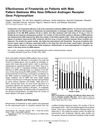Search
forLearn
5 / 16 resultslearn Epidermal Growth Factor
learn Osteopontin
signaling protein that, when suppressed, may grow hair by reducing inflammation and stem cell loss
learn Cyproterone
a synthetic anti-androgen and weak progestogen that inhibits DHT binding to androgen receptor
learn Pyrilutamide
highly targeted anti-androgen that might have minimal systemic effects
Research
5 / 1000+ results
research Androgen Receptor Gene Polymorphism and Polycystic Ovary Syndrome
The conclusion is that androgen receptor gene polymorphism might be a marker for polycystic ovary syndrome, but more research is needed.

research Androgen Receptor Gene Polymorphisms and Risk for Androgenetic Alopecia: A Meta-Analysis
G allele of AR Stul polymorphism linked to higher hair loss risk, especially in white people.
research Androgen Receptor Gene Polymorphism and Prostate Zonal Volumes in Australian and Chinese Men
CAG repeat polymorphism and prostate zone volume are not reliable markers of long-term androgen sensitivity.

research Effectiveness of Finasteride on Patients with Male Pattern Baldness Who Have Different Androgen Receptor Gene Polymorphism
Finasteride works better for baldness in people with shorter gene repeats.

research Androgenetic Alopecia and Polymorphism of the Androgen Receptor Gene (SNP rs6152) in Patients with Benign Prostate Hyperplasia or Prostate Cancer
Hair loss gene linked to prostate issues.
Community Join
5 / 1000+ resultscommunity Occipitalis Muscle Tension Theory
Scalp tension from the occipitalis muscle is theorized to contribute to hair loss, but most believe DHT and genetics are the main causes. Treatments like finasteride and minoxidil are considered more effective than addressing scalp tension.
community New and Interesting HairLoss Studies/Papers/Reviews
Hair loss treatments discussed include Dutasteride with Ketoconazole, tissue engineering strategies, and androgenetic alopecia therapies. Massage doubles follicular retention, improving treatment effectiveness.
community TWIST-1 and the cure: Is it really that easy?
TWIST-1 gene's role in hair loss and potential as a treatment target. Inhibiting TWIST-1 may prolong hair growth and reduce hair follicle sensitivity to DHT.
community My Theory Of Androgenic Alopecia
Hair loss is linked to cellular physiology and the IGF-1 to TGF-B1 ratio, not just androgen sensitivity. The theory lacks evidence, while finasteride and minoxidil are effective treatments.
community Maintaining hair until Breezula without Fin
A 21-year-old male experienced side effects from topical finasteride and is seeking alternative treatments to maintain hair until Breezula is available. He is considering using minoxidil, Nizoral, micro-needling, and vitamin D supplementation, and may try CB or RU58841 if necessary.